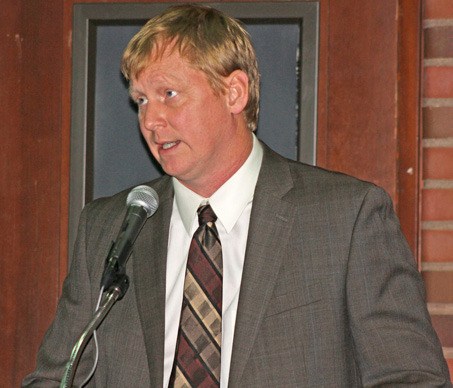The Kent City Council told businessman Chris Kealy to take his potential 102 jobs and shove them.
The council voted 4-3 on Tuesday night to approve a six-month moratorium to keep marijuana businesses out of Kent.
Kealy, of Tacoma, told the council he and his partners planned to invest $20 million in the city to start up recreational marijuana production and processing plants that would employ as many as 102.
“What I plan on doing would be behind closed doors, under gate, lock and key and it would have no public awareness,” Kealy said to the council. “My business plan is a producer processor level to deliver to the dispensaries that do get authorized that may or may not be in your city.”
Voters statewide approved Initiative 502 in November 2012 to allow recreational marijuana producers, processors and retailers. The state Liquor Control Board is taking applications over the next 30 days for those who want to operate the new businesses.
But the council voted the same as it did in June 2012 to ban medical marijuana collective gardens. Les Thomas, Bill Boyce, Dana Ralph and Deborah Ranniger voted in favor of the moratorium. Council President Dennis Higgins, Elizabeth Albertson and Jamie Perry were against it.
None of the council members who voted in favor of the ban spoke to the issue at the meeting. They all previously have stated they oppose marijuana businesses in the city because the drug remains illegal at the federal level.
Thomas told Kealy at a council committee meeting last week that, “This is not a friendly place to locate this business.”
Albertson made her views clear before the vote.
“What is before us is the issue of whether we are going to say no to a $20 million investment in our community and whether we are going to say no to 102 employees,” Albertson said. “I remind this council that they gave a huge tax break to a casino (Great American) to keep less employees than this and took money out of the pockets of residents to prop up a casino and yet we are considering to not allow a business to invest in our community.
“The people of Washington state have said they want access to recreational marijuana within this state and everyone who lives here has the right to that. By saying no to investment and revenue opportunities we are saying to the people who live here well, then we’re going to need to do something else like raise your property taxes.”
Higgins said he hopes the council during the next six months looks at ways to allow recreational businesses.
“I hope having it (the moratorium) will give us an opportunity to craft some thoughtful legislation instead of just putting our heads in the sand,” Higgins said.
Perry added that the long list of cities that have outlawed marijuana could lead to less power over regulation by the cities down the road.
“At some point if the cities don’t play ball, the next logical option for these folks is to go to the state or the voters to overrule us,” Perry said. “I think that rendering ourselves irrelevant is probably not a good place to be in the process. People have spoken over and over again and we need to listen to our own voters in coming up with rezone regulations and ways to work with these people. Unfortunately, I think Council member Higgins was absolutely right when he said we are sort of burying our heads in the sand.”
Pat Fitzpatrick, acting city attorney, recommended the council pass a ban to clearly define the city’s ban. He said city legal staff believed earlier this year that the city’s ban on medical marijuana would be enough to keep recreational marijuana businesses out of the city. But the rules adopted by the liquor board and possible changes by the Legislature about medical marijuana laws makes a new recreational marijuana moratorium necessary.
“I think three of the council people got it exactly correctly,” Kealy said during an interview after the vote. “The council person (Perry) that said just following the adjoining jurisdictions is doing exactly what I’m saying. You’re opening the whole region up to the state attorney general saying you’re all going to have to play now. I thought if they waited this 30-day (state licensing) process and took the applications that came in they might have avoided the avalanche that might have come. I think this will make them a bigger target.”
Kealy said he still wants to enter the recreational marijuana business.
“I’m still going to apply and follow the process at the state level,” Kealy said. “I’m already half pregnant on building the building so I’m going to continue to build the building. The state allows you three producer and three processor licenses so I will definitely be shopping other jurisdictions tomorrow (Wednesday) for other warehouse space and move on.
“The city of Kent says it wants economic activity and then it betrays itself. In my five or seven years of doing business here it has netted me not a lot of good result, unfortunately.”
The city will have a public hearing about the six-month moratorium, which starts five days after passage, at the Jan. 7 council meeting. State law requires the hearings within 60 days of passing a moratorium.
Talk to us
Please share your story tips by emailing editor@kentreporter.com.
To share your opinion for publication, submit a letter through our website https://www.kentreporter.com/submit-letter/. Include your name, address and daytime phone number. (We’ll only publish your name and hometown.) Please keep letters to 300 words or less.

